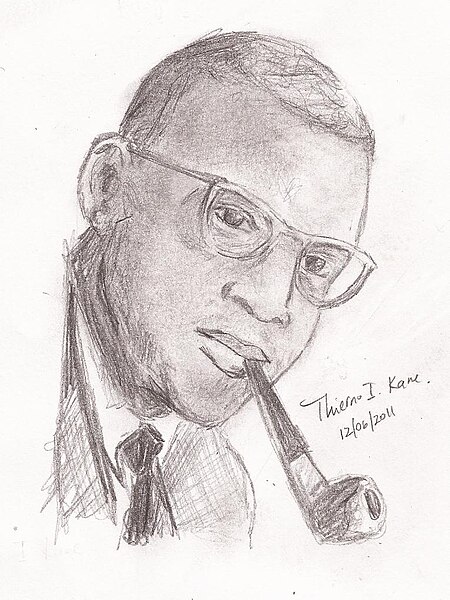In the case where fear presses back
Through the air, where the torch has expired
On the orphan river,
In the forest, soulless and tired,
Under the anxious and faded trees,
In the wan woods, squalling trunks
Ululate without respite
Over the accursed tom-toms,
Black night! Black night!
—from "Nuit Noire" by Birago Diop, translated by Uche Ogbuji
This poem is excerpted from Birago Diop's short story "Sarzan", well known among literati with interest in African culture. I can only find it in French online right now, but I first encountered it in the collection Jazz and Palm Wine which my father loved and would sometimes read to the family. The excerpt above is from the very end, and I translated it form the French original:
Dans la case où la peur repasse
Dans l'air où la torche s'éteint,
Sur le fleuve orphelin
Dans la forêt sans âme et lasse
Sous les arbres inquiets et déteints,
Dans les bois obscurcis
Les trompes hurlent, hululent sans merci
Sur les tam-tams maudits,
Nuit noire ! Nuit noire !
I've watched the "Kony 2012" hype and the subsequent controversy with both amusement and bemusement, thought I've thought whatever comment I might have better kept to myself. I wasn't even paying much attention to the whole affair except for a few nuggets that would strike me, usually from when it was on the news my wife was watching in the other room. The first case was when I believe NBC said they would be sending a crew to Uganda to do some fact-checking on the story. That really annoyed me.
Here is a list just off head:
- Major unrest in Burkina Faso last year
- Ethno-religious strife in Nigeria's middle belt
- Al-Quaeda-inspired terrorism in Nigeria's North
- The Nigerian fuel subsidy removal unrest
- An oil spill by Shell almost as bad as the Deepwater Horizon disaster (in terms of environmental impact rather than barrels of oil)
- South Sudan's independence
- Eradication of Rhinderpest
- Famine in East Africa
- The arrest of Gbagbo in Côte d'Ivoire following the mayhem he caused after elections
- The election of Ellen Johnson Sirleaf in Liberia
- One of the most engaging African Cup of Nations competitions in my own memory (OK I had to throw that last bit in there).
So many compelling stories coming out of sub-saharan Africa, and it took a viral Youtube video to get NBC to send a crew to the continent. Even if you were only interested in Uganda, the non-violent protests led by Besigye against Museveni alone were more newsworthy than "Kony 2012".
Now don't get me wrong. Joseph Kony and the LRA have been shocking and disgusting me for at least fifteen years, and of course I'd love to see him brought to justice, but the problem with Kony 2012 is that it perpetuates the approach of over-hype and lazy hyper-focus on one topic that has characterized so much popular Western attention on the continent. It's "Do they know it's Christmas time at all" all over again, and don't let me start on that unspeakable nonsense.
Anyway another snippet from the "Kony 2012" affair that struck me was the clip of the video's creator I half caught in which he was itching about some U.S. city street in the nude while muttering loudly. It instantly brought back a very powerful reminder of Birago Diop's short story, which Professor Willfried Feuser translated in his collection as "Sarzent the Madman." The "Sarzent" ("sergeant") of the story has returned from his military education in France loudly determined to "civilize" his home village. He becomes possessed by the spirits of his ancestors and goes around raving in poetry. I see the broader lesson of the story about the peril of insincerity couched in self-righteousness, especially when rooted in alien, Western values. That's certainly how the story struck me as a child, and in that wise I find the correspondence to this madness of Jason Russell extremely creepy. A friend of mine mentioned that it's as if the man was stricken by the Igbo deity Agwu Nsi.
Some of the ravings of Sarzan/Sarzent come from Diop's earlier poetry, including his lovely "Souffles" ("Breaths"):
Écoute plus souvent
les choses que les êtres.
La voix du feu s'entend,
entends la voix de l'eau
écoute dans le vent
le buisson en sanglots.
I found the above video with the poem's recitation. I translate it thusly:
Listen more often
To things than to beings.
The fire's voice is heard,
Hear the voice of the water
Listen in the wind
To the bush a-sobbing.

